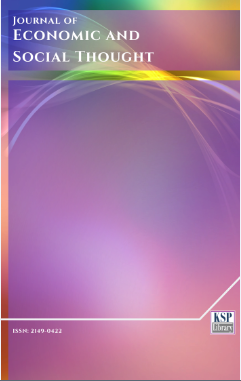Assessment of the efficiency of public education expenditure on literacy rate in Nigeria
Abstract
Abstract. Bearing in mind the critical role of education in the development of human capital base of a nation, it is widely accepted that government has a major role to play in guaranteeing the provision of educational opportunities. Therefore, it is expected that adequate finance to the education sector would translate to improvement in educational outcome in the country. Motivated by this, the study reexamined the impact of government education expenditure on educational outcome in Nigeria from 1980 to 2018. The study adopted the Autoregressive Distributed lag (ARDL) bounds testing approach in estimating the relevant relationship while the ECM captured the speed of short run adjustment to long run equilibrium. The result of the study showed a positive, but insignificant relationship between public education expenditure and educational outcome in Nigeria. Arising from the findings, the study recommends for an adequate and prudent financing to the education sector necessary to guarantee enhanced literacy rate in Nigeria.
Keywords. Government education expenditure, Educational outcome.
JEL. H52.Keywords
References
Abiodun, A.A. (2002). Rebuilding the foundations of education in Nigeria, Newsletter of the Social Science Academy of Nigeria, 5(2), 21-31.
Anyanwu, J.C., & Erhijakpor, A.E. (2007). Education expenditures and school enrolment in Africa: Illustrations from Nigeria and the other SAWE Countries. Paper presented at the 50th Anniversary and Annual Conference of the Nigerian Economic Society, Abuja, Nigeria.
Dauda, R. (2011). Effect of public educational spending and macroeconomic uncertainty on schooling outcome: Evidence from Nigeria. Journal of Economics, Finance and Administrative Science, 16(31), 7-21.
Edame, G.E., & Eturoma, A.D. (2014). The determinants of public expenditure on educational infrastructural facilities and economic growth in Nigeria. Journal of Business Management and Economics, 5(6), 152-161.
Gupta, S., Verhoeven, M., & Tiongsan, E. (1999). Doeshigher spending buy better results in education and health care?, IMF Working Paper No.WP/99/21. [Retrieved from].
Hanushek, E. (1996). School resources and student performance. In G. Burtless (Edt), Does Money Matter: The Link between Schools, Student Achievement and Adult Success, (pp.43–73), Washington, DC: Brookings Institute.
Musgrave, R.A., & Musgrave, P.B. (1989). Public Finance in Theory and Practice. 5th Edition. New York: McGraw-Hill International Editions, Finance Series.
Obi, Z.C., & Obi, C.O. (2014). Impact of government expenditure on education: The Nigerian experience. International Journal of Business and Finance Management Research, 2(1), 42-48.
Odeleye A.T. (2012). Education and economic growth in Nigeria: A comparative analytical approach. European Journal of GlobalDevelopment Research, 6(1), 330-342.
Peacock, A., & Wiseman, J. (1967). The Growth of Public Expenditure in the UK. Princeton, USA: Princeton University Press.
Ude, D., & Ekesiobi, S. (2014). Panel investigation of states social spending and social outcome: Perspective of education in Nigeria. International Journal of Economics, Finance and Management, 3(5), 244–255.DOI: http://dx.doi.org/10.1453/jest.v7i1.2030
Refbacks
- There are currently no refbacks.
Journal of Economic and Social Thought - J. Econ. Soc. Thoug. - JEST - www.kspjournals.org
ISSN: 2149-0422
Editor: jest@ksplibrary.org Secretarial: secretarial@ksplibrary.org Istanbul - Turkey.
Copyright © KSP Library




